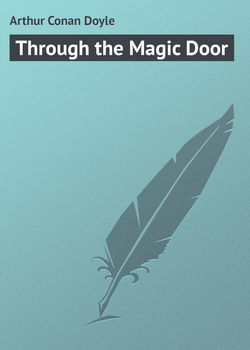Through the Magic Door

Реклама. ООО «ЛитРес», ИНН: 7719571260.
Оглавление
Arthur Conan Doyle. Through the Magic Door
I
II
III
IV
V
VI
VII
VIII
IX
X
XI
XII
Отрывок из книги
It is a great thing to start life with a small number of really good books which are your very own. You may not appreciate them at first. You may pine for your novel of crude and unadulterated adventure. You may, and will, give it the preference when you can. But the dull days come, and the rainy days come, and always you are driven to fill up the chinks of your reading with the worthy books which wait so patiently for your notice. And then suddenly, on a day which marks an epoch in your life, you understand the difference. You see, like a flash, how the one stands for nothing, and the other for literature. From that day onwards you may return to your crudities, but at least you do so with some standard of comparison in your mind. You can never be the same as you were before. Then gradually the good thing becomes more dear to you; it builds itself up with your growing mind; it becomes a part of your better self, and so, at last, you can look, as I do now, at the old covers and love them for all that they have meant in the past. Yes, it was the olive-green line of Scott's novels which started me on to rhapsody. They were the first books I ever owned – long, long before I could appreciate or even understand them. But at last I realized what a treasure they were. In my boyhood I read them by surreptitious candle-ends in the dead of the night, when the sense of crime added a new zest to the story. Perhaps you have observed that my "Ivanhoe" is of a different edition from the others. The first copy was left in the grass by the side of a stream, fell into the water, and was eventually picked up three days later, swollen and decomposed, upon a mud-bank. I think I may say, however, that I had worn it out before I lost it. Indeed, it was perhaps as well that it was some years before it was replaced, for my instinct was always to read it again instead of breaking fresh ground.
I remember the late James Payn telling the anecdote that he and two literary friends agreed to write down what scene in fiction they thought the most dramatic, and that on examining the papers it was found that all three had chosen the same. It was the moment when the unknown knight, at Ashby-de-la-Zouch, riding past the pavilions of the lesser men, strikes with the sharp end of his lance, in a challenge to mortal combat, the shield of the formidable Templar. It was, indeed, a splendid moment! What matter that no Templar was allowed by the rules of his Order to take part in so secular and frivolous an affair as a tournament? It is the privilege of great masters to make things so, and it is a churlish thing to gainsay it. Was it not Wendell Holmes who described the prosaic man, who enters a drawing-room with a couple of facts, like ill-conditioned bull-dogs at his heels, ready to let them loose on any play of fancy? The great writer can never go wrong. If Shakespeare gives a sea-coast to Bohemia, or if Victor Hugo calls an English prize-fighter Mr. Jim-John-Jack – well, it was so, and that's an end of it. "There is no second line of rails at that point," said an editor to a minor author. "I make a second line," said the author; and he was within his rights, if he can carry his readers' conviction with him.
.....
But what a glorious brotherhood the novels are! Think of the pure romance of "The Talisman"; the exquisite picture of Hebridean life in "The Pirate"; the splendid reproduction of Elizabethan England in "Kenilworth"; the rich humour of the "Legend of Montrose"; above all, bear in mind that in all that splendid series, written in a coarse age, there is not one word to offend the most sensitive car, and it is borne in upon one how great and noble a man was Walter Scott, and how high the service which he did for literature and for humanity.
For that reason his life is good reading, and there it is on the same shelf as the novels. Lockhart was, of course, his son-in-law and his admiring friend. The ideal biographer should be a perfectly impartial man, with a sympathetic mind, but a stern determination to tell the absolute truth. One would like the frail, human side of a man as well as the other. I cannot believe that anyone in the world was ever quite so good as the subject of most of our biographies. Surely these worthy people swore a little sometimes, or had a keen eye for a pretty face, or opened the second bottle when they would have done better to stop at the first, or did something to make us feel that they were men and brothers. They need not go the length of the lady who began a biography of her deceased husband with the words – "D – was a dirty man," but the books certainly would be more readable, and the subjects more lovable too, if we had greater light and shade in the picture.
.....